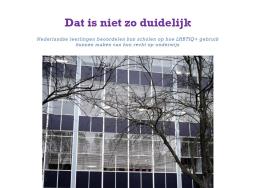Research shows that Dutch schools are hardly a transformative experience for LGBTIQ+ students

24 April 2024 - In this global action week for transformative education, GALE published a research which shows how Dutch LGBTIQ+ students feel that their schools are hardly a transformative experience. GALE did a survey among high school students and asked their assessment of how 15 key aspects of the right to education were implemented for LGBTIQ+ students. The general impression was that this “is not so clear”, which eventually also became the title of the report. This research among students is part of a renewed GALE assessment of the Dutch national LGBTIQ+ education policy, which will be published next month.
Transformative or ambiguous
GALE periodically assesses countries on how they ensure the right to education for sexually and gender diverse students. A new part of the assessment method is to conduct a survey among students about how they experience this happening at their school. In 2023, GALE asked Dutch students to rate their schools. The report was published today in the context of the global action week for (transformative) education by the Global Campaign for Education (GCE). GALE and the GCE aim to transform schools to places of real comfort and learning, which clearly is not yet the case for Dutch LGBTIQ+ students.
GALE distinguishes three main phases in the education policy of countries: denying, ambiguous, or supportive. In 2017, GALE reviewed the Dutch education policy as supportive. This was based on new legislation and numerous project initiatives of the Dutch government. However in the last decade policy initiatives became less and stagnated. The results from the new questionnaire among students show how unclear it is for students whether the school has an LGBTIQ+ supportive policy. This ambiguity is in line with the impression that the supportive Dutch policy is falling back to into ambiguity.
Students cannot make an assessment
Students were asked to rate 15 aspects of the right to education for sexually and gender diverse students. On most checkpoints many students indicate they do not know the answer - even if it is only asking their own subjective assessment. It may be that many cisgender heterosexual students have never thought about the situation of sexually and gender diverse students. But sexually and gender diverse students also often indicate that they cannot assess the application of certain rights, or they are strongly divided about it. The main conclusion of the research is therefore that for a majority of students it is unclear whether educational rights for sexually and gender diverse students are effectively applied.
Application or rights differs across on specific staff members
Of the students who do give an opinion, cisgender heterosexual students are often more positive in their assessment than their sexually and gender diverse schoolmates. Sexually and gender diverse students are generally not overtly negative, but they do doubt more than cisgender heterosexual students whether the school is consistent with their rights. This is particularly evident from how often they say that the application of rights depends on individual staff members . In addition, there are a lot of sexually and gender diverse students who disagree with each other about whether a right is applied. These differences in assessment may indicate that there is no school policy on these points, or that the school policy is not implemented effectively and visibly. From some comments that students make, we get the impression that the intentions of the schools are good, but that the proper implementation of policy is still lacking.
Although there are some differences between the schools studied, this overall picture is reflected in all the schools studied. GALE noticed that the Netherlands employ an strong neoliberal and decentralized policy, which leaves the ultimate responsibility to implement policy solely to individual schools. In practice, such a policy falls short of guaranteeing that the right to education is actually implemented effectively in the case of sexually and gender diverse students.
Sources: Dankmeijer (2024) Dat is niet zo duidelijk (That’s not so clear) (in Dutch), GCE Global Action Week for Education


